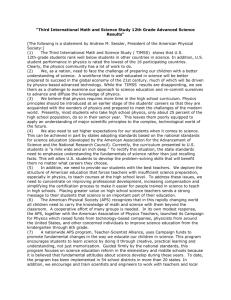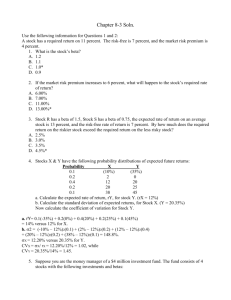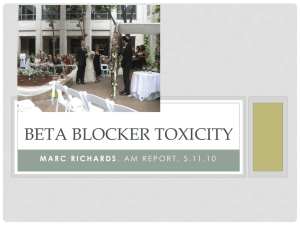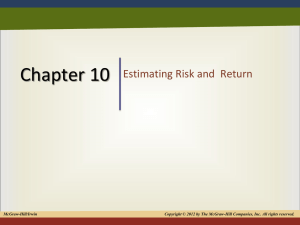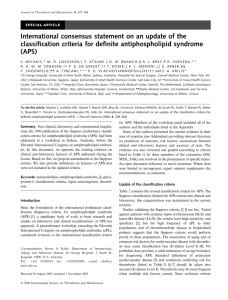Anti-Beta-2-Glycoprotein I Antibody
advertisement
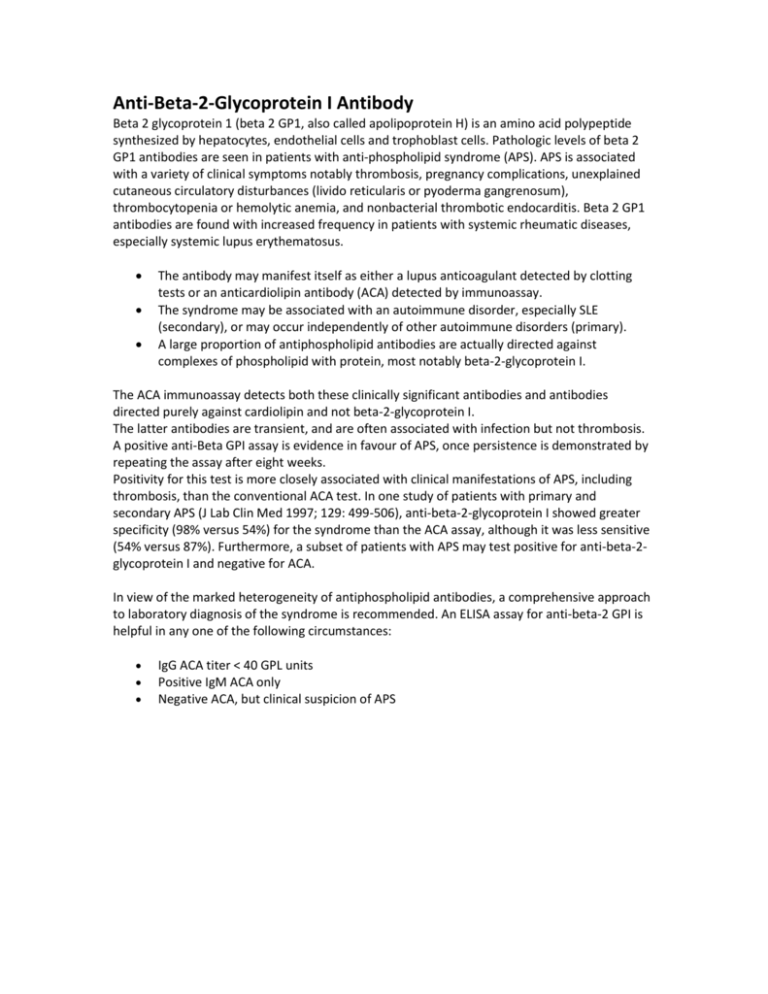
Anti-Beta-2-Glycoprotein I Antibody
Beta 2 glycoprotein 1 (beta 2 GP1, also called apolipoprotein H) is an amino acid polypeptide
synthesized by hepatocytes, endothelial cells and trophoblast cells. Pathologic levels of beta 2
GP1 antibodies are seen in patients with anti-phospholipid syndrome (APS). APS is associated
with a variety of clinical symptoms notably thrombosis, pregnancy complications, unexplained
cutaneous circulatory disturbances (livido reticularis or pyoderma gangrenosum),
thrombocytopenia or hemolytic anemia, and nonbacterial thrombotic endocarditis. Beta 2 GP1
antibodies are found with increased frequency in patients with systemic rheumatic diseases,
especially systemic lupus erythematosus.
The antibody may manifest itself as either a lupus anticoagulant detected by clotting
tests or an anticardiolipin antibody (ACA) detected by immunoassay.
The syndrome may be associated with an autoimmune disorder, especially SLE
(secondary), or may occur independently of other autoimmune disorders (primary).
A large proportion of antiphospholipid antibodies are actually directed against
complexes of phospholipid with protein, most notably beta-2-glycoprotein I.
The ACA immunoassay detects both these clinically significant antibodies and antibodies
directed purely against cardiolipin and not beta-2-glycoprotein I.
The latter antibodies are transient, and are often associated with infection but not thrombosis.
A positive anti-Beta GPI assay is evidence in favour of APS, once persistence is demonstrated by
repeating the assay after eight weeks.
Positivity for this test is more closely associated with clinical manifestations of APS, including
thrombosis, than the conventional ACA test. In one study of patients with primary and
secondary APS (J Lab Clin Med 1997; 129: 499-506), anti-beta-2-glycoprotein I showed greater
specificity (98% versus 54%) for the syndrome than the ACA assay, although it was less sensitive
(54% versus 87%). Furthermore, a subset of patients with APS may test positive for anti-beta-2glycoprotein I and negative for ACA.
In view of the marked heterogeneity of antiphospholipid antibodies, a comprehensive approach
to laboratory diagnosis of the syndrome is recommended. An ELISA assay for anti-beta-2 GPI is
helpful in any one of the following circumstances:
IgG ACA titer < 40 GPL units
Positive IgM ACA only
Negative ACA, but clinical suspicion of APS
Sample requirement is one SST tube of blood. The sample submitted for the anticardiolipin
assay can be used for this assay.
The diagnosis of APS requires at least 1 clinical criteria and 1 laboratory criteria be met.(5) The
clinical criteria include vascular thrombosis (arterial or venous in any organ or tissue) and
pregnancy morbidity (unexplained fetal death, premature birth, severe preeclampsia, or
placental insufficiency). Other clinical manifestations, including heart valve disease, livedo
reticularis, thrombocytopenia, nephropathy, neurological symptoms, are often associated with
APS but are not included in the diagnostic criteria. The laboratory criteria for diagnosis of APS
are presence of lupus anticoagulant, presence of IgG and/or IgM anticardiolipin antibody (>40
GPL, >40 MPL or >99th percentile), and/or presence of IgG and/or IgM beta 2 GP1 antibody
(>99th percentile). All antibodies must be demonstrated on 2 or more occasions separated by at
least 12 weeks. Direct assays for beta 2 GP1 antibodies have been reported to be somewhat
more specific (but less sensitive) for disease diagnosis in patients with APS.(4) Anticardiolipin
and beta 2 GP1 antibodies of the IgA isotype are not part of the laboratory criteria for APS due
to lack of specificity.
Reference Values
<10.0 U/mL (negative)
10.0-14.9 U/mL (borderline)
> or =15.0 U/mL (positive)
Results are expressed in arbitrary units.
Reference values apply to all ages.
Interpretation
Strongly positive results for beta 2 glycoprotein 1 (beta 2 GPI) antibodies (>40 U/mL for IgG
and/or IgM) are diagnostic criterion for antiphospholipid syndrome (APS). Lesser levels of beta 2
GP1 antibodies and antibodies of the IgA isotype may occur in patients with clinical signs of APS
but the results are not considered diagnostic. Beta 2 GP1 antibodies must be detected on 2 or
more occasions at least 12 weeks apart to fulfill the laboratory diagnostic criteria for APS.
Detection of beta 2 GP1 antibodies is not affected by anticoagulant treatment.
Cautions
The immunoassay for beta 2 glycoprotein 1 (beta 2 GP1) antibodies does not distinguish
between autoantibodies and antibodies produced in response to infectious agents or as
epiphenomena following thrombosis. For this reason, a single positive test result is not sufficient
to meet accepted serologic criteria for the diagnosis of antiphospholipid syndrome.
Comparative studies and interlaboratory proficiency surveys indicate that results of beta 2 GP1
antibody tests can be highly variable and results obtained with different commercial
immunoassays may yield substantially different results.(5)
Clinical Reference
1. Caronti B, Calderaro C, Alessandri C, et al: Beta 2 glycoprotein 1 (beta 2 GP1) mRNA is
expressed by several cell types involved in anti-phospholipid syndrome-related tissue damage.
Clin Exp Immunol 1999;115:214-219
2. Lozier J, Takahashi N, Putnam F: Complete amino acid sequence of human plasma beta 2
glycoprotein 1. Proc Natl Acad Sci USA 1984;81:3640-3644
3. Kra-Oz Z, Lorber M, Shoenfeld Y, et al: Inhibitor(s) of natural anti-cardiolipin autoantibodies.
Clin Exp Immunol 1993;93:265-268
4. Audrain Ma, El-Kouri D, Hamidou MA, et al: Value of autoantibodies to beta(2)-glycoprotein 1
in the diagnosis of antiphospholipid syndrome. Rheumatology (Oxford) 2002;41:550-553
5. Wong RCW, Flavaloro EJ, Adelstein S, et al: Consensus guidelines on anti-beta 2 glycoprotein I
testing and reporting. Pathology 2008 Jan; 40(1):58-63
6 Cucnik S, Kveder T, Krizaj I, Rozman B, Bozic B. High avidity anti-beta 2-glycoprotein I
antibodies in patients with antiphospholipid syndrome Ann Rheum Dis. 2004 Nov; 63(11):147882.
7. M Teixidó, J Font, J C Reverter, R Cervera, D Tàssies, M Ingelmo, G Escolar and A Ordinas Antibeta 2-glycoprotein I antibodies: a useful marker for the antiphospholipid syndrome.
Rheumatology Volume36, Issue1, Pp. 113-116.
8. Bill Giannakopoulos1, Freda Passam1, Yiannis Ioannou1, and Steven A. Krilis1 How we
diagnose the antiphospholipid syndrome Blood 2009 113:985-994
9. Danowski A, Kickler TS, Petri M. Anti-beta2-glycoprotein I: prevalence, clinical correlations,
and importance of persistent positivity in patients with antiphospholipid syndrome and systemic
lupus erythematosus. J Rheumatol 2006;33:1775-1779.
10. M. A. P. Audrain, D. El Kouri 1 , M. A. Hamidou 1 , L. Mioche, A. Ibara, M.‐L. Langlois and J.‐Y.
Muller Value of autoantibodies to {beta}2-glycoprotein 1 in the diagnosis of antiphospholipid
syndrome Rheumatology (Oxford) May 1, 2002 41: 550-553
